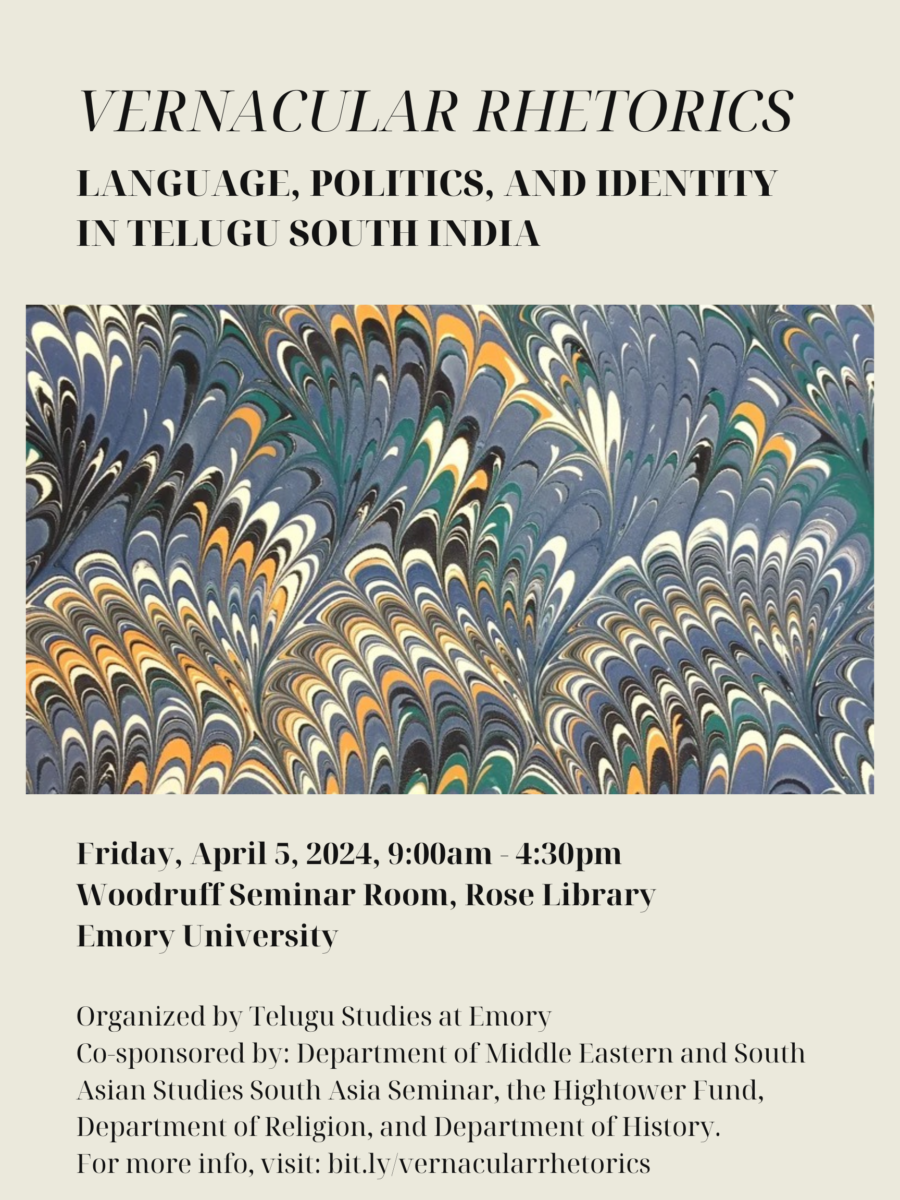

Symposium Overview
This one-day symposium brings together new scholarship and diverse perspectives on the Telugu language and its role in shaping critical discourse and political community in South Asia over the twentieth century. It features six scholars interested in the innovative – yet often competing – cultural and political movements that shaped the great struggles for self-determination and civil liberties of this period.
In exploring the rhetoric of these movements, these scholars interrogate conventional understandings of Telugu language activism and highlight the possibilities and dilemmas of vernacular publics in South Asia. Ultimately, the symposium aims to serve as a forum that sheds new light on shifting notions of politics, language, and identity during the twentieth century.
The symposium will be held on Friday, April 5, 2024, at the Woodruff Library and is part of the Telugu Studies initiative at Emory University. The event is organized by Dr. Gautham Reddy (South Asia and Religion Librarian, Woodruff Library) in collaboration with Dr. Harshita Mruthinti Kamath (Visweswara Rao and Sita Koppaka Associate Professor in Telugu Culture, Literature and History, Department of Middle Eastern and South Asian Studies).
Schedule and Abstracts
9:00 a.m.: “Libraries for Non-Readers: Autochthony and World Literature,” Sravanthi Kollu, Boston University
Respondent: Shiv Subramaniam, Emory University
Abstract: This essay reframes the public library’s locus in world literature by foregrounding the significance of the non-reader for the Telugu public library movement. Its attention to the movement’s focus on the indigent who would remain outside literacy and literary culture, i.e., the non-reader, diverges in two significant ways from existing scholarship. First, it argues that the library is best understood as a literary institution that coheres around the presumed and ongoing absence of readers. The essay hence reorients key comparative and postcolonial interventions that query the “normative limits of the literary” (Michael Allan) and posit anticolonial literary politics on reading as a radical practice. Second, it foregrounds orature, community and citizenship as key rubrics within the library movement. It thereby establishes the conceptual continuum between radical anticolonial and conservative ethnonationalist responses to liberal imperialism, against the scholarly and popular tendency to place the public library outside the vagaries of conservatism. To make these two interventions the essay locates the Telugu library movement within the broader anticolonial history of the movement for libraries in South India.
10:00 a.m.: “The Social Imaginaries of Telugu Neoclassicism,” Gautham Reddy, Emory University
Respondent: Rama Mantena, University of Illinois-Chicago
Abstract: The nineteenth century bore witness to drastic transformations in the cultural imagination and political deployment of the Telugu language. What had once been cultivated as a courtly language of power and prestige across the pre-colonial Deccan came to be considered an instrumental “vernacular language” in the administration of British colonial India. Encounters between European Orientalists and Indian Pundits in Madras first gave rise to the distinctly modern prose of Neoclassical or “Granthika” Telugu. This highly ornate style flourished for over a hundred years as the preeminent register of Telugu literary, scientific, and political writing before its eclipse by today’s standard of Spoken or “Vyavaharika” Telugu. Much has been written on the growth of Vyavaharika and its democratic and modernizing impulses vis-à-vis Granthika in the later twentieth century. This essay returns to the late nineteenth century, at the apex of Granthika’s cultural influence, in order to retrieve the social imaginaries that idealized its authority and appeal. It looks specifically at a set of speeches documented at the 1897 Congress of Telugu Pundits in Bellary and illuminates the aspirations and contradictions that shaped attachments to Granthika Telugu in colonial south India. Through this, a more vivid picture of the long life and career of Telugu Neoclassicism may begin to emerge.
11:00 a.m.: “Tuning in for Telugu: Radio and Language in India (1923-1960),” Rumya S. Putcha, University of Georgia
Respondent: Harshita Mruthinti Kamath, Emory University
Abstract: On May 19, 1954, a music scholar named Vissa Appa Rao (1884-1966) gave a lecture on All-India Radio. Broadcast on short-wave from New Delhi, Rao delivered a speech in English about a little known dance style, Kuchipudi. Importantly, this speech preceded the first All-India Dance Seminar of 1958 held in New Delhi where each region of the new republic was able to demonstrate their dance traditions and thus their relevance to the broader project of cultural nationalism. Taking Appa Rao’s speech as a jump-off point, this presentation traces a longer sonic history of Telugu belonging through the radio. Drawing on methods of radio scholarship (see e.g. Huacuja Alonso 2022) Putcha listen closely for how claims to Telugu identity resonated with the political projects of the early to mid-twentieth century. Ultimately, this presentation offers an aural history of Telugu, arguing that by paying attention to how and why listeners tuned into the radio, one can understand the significance of language in the era of decolonization and nation-building.
-Afternoon Session-
1:30 P.M.: “1948 Police Action and the Language Politics in Hyderabad,” Afsar Mohammad, University of Pennsylvania
Respondent: Scott Kugle, Emory University
Abstract: I draw on research from my new book, Remaking History: 1948 Police Action and the Muslims of Hyderabad (Cambridge, 2023). I examine language politics around the use of Urdu and Telugu during the forced integration of Hyderabad State into the Indian Union and the princely territory’s subsequent reimagination as part of a Telugu heartland. The essay focuses on strategies for community narration and historical preservation adopted by ordinary people in the region.
2:30 p.m.: “Provinces, Federalism, and the Politics of Language 1900-1948,” Rama Mantena, University of Illinois-Chicago
Respondent: Chris Chekuri, San Francisco Stare University
Abstract: This essay draws on research from my new book, Provincial Democracy: Political Imaginaries at the End of Empire in Twentieth-Century South India (Cambridge, 2023). I discuss the Andhra Movement and the significance of Telugu-language activism and its emphasis on the region in relation to dominant discourses of Indian nationalism and new forms democratic practice.
3:30 p.m.: “Violence of Progress: K. Balagopal, Vernacular Political, and the Writing of Political Futures, Christopher Chekuri,” San Francisco State University
Respondent: Shiva Urella, Emory University
Abstract: Kandalla Balagopal (1952-2009) spent years at the forefront of a vibrant civil liberties movement in post-emergency India. In that time, he wrote countless essays, pamphlets, editorials, speeches, and fact-finding commission reports exploring the interplay between political power and the citizen. He wrote on caste and police violence, adivasi and dalit social movements, and agrarian political economy. His writings are an insightful archive of the ways the citizen is made and unmade in Indian politics.
This paper will explore K. Balagopal’s (1952-2009) prolific writings on Andhra and Indian politics in Telugu and English. Balagopal’s vernacular political imaginary enabled him to rethink metropolitan ideas of politics in distinctive ways, and reconstructed concepts from within the local and Telugu sphere. Most importantly, through his constant attention to violence, including its structural, personal, and affective dimensions, he laid the grounds for a rethinking of a new political future. The presentation will look at his essays on the Telugu political sphere of the 1980s-2000s, and examine how he developed novel and instrumental negotiations of caste, democracy, rights, and citizenship.